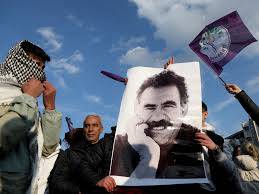
ISTANBUL, May 12, 2025 (BSS/AFP) - The Kurdistan Workers' Party (PKK) on
Monday announced its dissolution and the end of its armed struggle, drawing a
line under its deadly four-decade insurgency against the Turkish state.
Founded in the late 1970s by Abdullah Ocalan, the PKK took up arms in 1984,
beginning a string of bloody attacks on Turkish soil that sparked a conflict
that cost more than 40,000 lives.
The PKK "has decided to dissolve... and end its armed struggle," it said in
a statement after a landmark leadership congress, saying it had brought "the
Kurdish issue to a point where it can be resolved through democratic politics."
Foreign Minister Hakan Fidan hailed the move as an "extremely important
step" for both domestic and regional security.
"The decision taken by the PKK is a historic and important decision,
especially in terms of permanent peace and stability in our region," he told
reporters, saying there was "much to be done" to ensure its implementation.
The move was also welcomed as a boost for regional security by top
officials in Syria and Iraq, and hailed by the European Union.
Ocalan had in February urged his fighters to disarm and disband in a letter
from Imrali prison island where he has been held since 1999. He also asked the
PKK to hold a congress to formalise the decision.
The declaration was the culmination of seven months of work to renew
long-stalled talks that began in October when Ankara offered Ocalan an
unexpected olive branch.
The news won a cautious welcome on the streets of Diyarbakir, the main city
in Turkey's Kurdish-majority southeast, where locals have seen repeated efforts
to end the violence come to naught.
"We want this process to move forward and not be left unfinished. They
shouldn't deceive the Kurds as they did before. We really want peace," 60
year-old-worker Fahri Savas told AFP.
- 'A pivotal moment' -
With PKK fighters present in both Syria and Iraq, the movement's
dissolution is likely to reverberate in both nations.
Syria's top diplomat Asaad al-Shaibani said it was "a pivotal moment" not
only for Turkey, "but for the stability of our region as a whole".
Nechirvan Barzani, president of Iraq's Kurdistan region -- a crucial
powerbroker in Kurdish affairs with close ties to Ankara -- hailed the
"political maturity" of the decision, saying it would boost "stability in
Turkey and the region".
Brussels urged "all parties to seize the moment" to resolve the
decades-long Kurdish question -- echoing a call by Turkey's pro-Kurdish
opposition DEM party, which played a key role in the process.
"The door to a political solution to the Kurdish problem has been thrown
wide open," DEM spokeswoman Aysegul Dogan told reporters.
"We should not waste this great opportunity.. Peace is no longer a dream."
- Ocalan to benefit –
Despite talk of parole for Ocalan, who has spent more than 25 years serving
life in solitary confinement, it was unlikely he would leave Imrali prison
island.
"The conditions of his detention will be eased.. meetings with DEM and his
family will also be more frequent," a source from Erdogan's ruling AKP told the
pro-government Turkiye daily.
The move was also important for Erdogan.
"If the PKK announces it is disbanding and finalises the process without
any road accidents, that will be a huge win for Erdogan," Gonul Tol of the
Washington-based Middle East Institute told AFP.
She said seeking a rapprochement with the Kurds was very much related to
domestic politics, coming just months after Erdogan's AKP suffered a blow at
the ballot box.
Analysts say ending the Kurdish conflict could let Erdogan amend the
constitution and extend his term in office, while simultaneously driving a
wedge between pro-Kurdish parties and the rest of Turkey's opposition.
"The main driver behind this Ocalan opening has always been about
consolidating Erdogan's rule. Because if this whole process succeeds, he will
go into the 2028 elections as a stronger candidate who is facing a divided
opposition," Tol said.
The PKK was set up in 1978 with the original aim of carving out a homeland
for Kurds, who make up about 20 percent of Turkey's 85 million people, later
modifying its aims to seek greater autonomy.